Drinking Habits To Speed Up Abdominal Fat Loss as You Age, Say Dietitians

You can accelerate the loss of belly fat as you age by changing some of your nutrition habits, according to registered dietitians, and there's scientific research to back up their advice on drinking habits that can help with abdominal fat. But first, it may help to understand why we tend to put on abdominal fat as we age in the first place. It'll show how much control you have over your physiology, and it may motivate you to adjust your drinking lifestyle. This is what can happen as the years go by:
- Your fat-burning metabolism may slow down after 60.
- You can begin to lose muscle mass, which can further slow down your metabolism.
- Hormone changes in women after menopause and decreases in estrogen can cause fat to be deposited in the abdomen.
- People tend to continue the same patterns of eating and drinking over time, but this means consuming the same number of calories as in your younger years, if not more, while our resting metabolism burns fewer and fewer.
- You may exercise less.
In a 2010 study in the International Journal of Body Composition Research, scientists at the University of Alabama at Birmingham presented data showing that all those factors contribute to increases in the most dangerous type of fat, a deep belly fat known as visceral fat that surrounds our organs. The researchers found that visceral fat increases over 200% in men and 400% in women between their 30s and 70s.
That's the reality we face with aging. The uplifting news is that those Alabama researchers showed that exercise—increasing calorie burn—in particular, can slow that potential increase in visceral fat that tends to come with the passing years. Now, consider how reducing calorie consumption in combination with exercise might speed up the loss of your belly fat. One of the easiest ways to significantly reduce calories is by changing long-practiced drinking habits.
Read on for the changes you should make to your drinking habits to lose abdominal fat as you age, and for more, don't miss Eating Habits to Lose Abdominal Fat As You Age, Say Dietitians.
Start your day with water, and carry a jug.
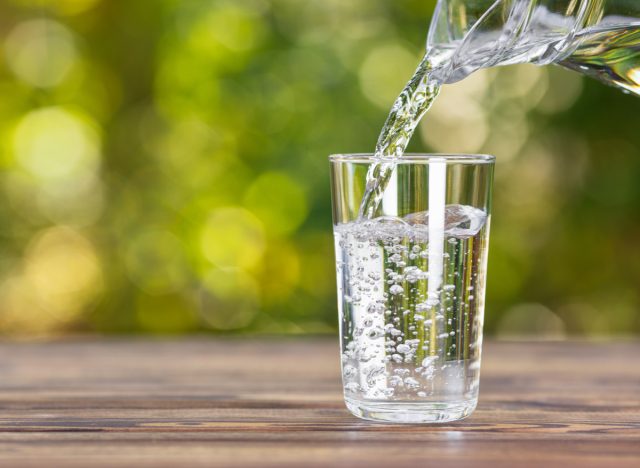
Of all the drinking habits for abdominal fat loss, consuming more water may be one of the easiest ones.
The calories in beverages are easy to forget because they are not dense like food, and they go down so easily. But drinks can be large contributors to calories in the diet when you consider all of the "luxurious coffee drinks, sodas, juices, homemade drinks, shakes, and protein shakes we consume," says registered dietitian Blanca Garcia, RDN, nutrition specialist at HealthCanal.
Garcia suggests starting your day by drinking a tall glass of water and keeping a bottle or jug of water handy to sip on throughout the day.
"By constantly drinking water, you will reduce the desire to consume calorie-rich drinks," she says.
And if you drink a glass of water before every meal, that belly-filling ritual will likely help you consume less food, suggests a study in the International Journal of Obesity. Researchers found that participants gained an average of three pounds every four years, but those who replaced one serving of sugar-sweetened beverages with a cup of water daily experienced less weight gain by an average of one pound every four years.
Drink your coffee black.
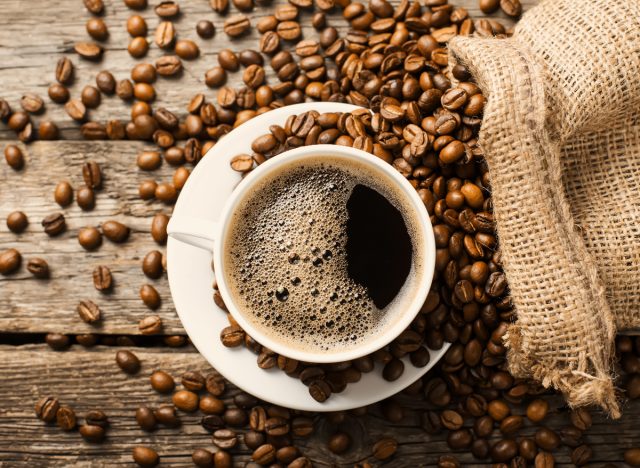
Drinking coffee without sugar or cream is a good drinking habit to lose abdominal fat for two reasons. First, the stimulant caffeine in coffee can in some cases increase your resting metabolism and blunt your hunger by decreasing levels of hunger hormones.
For example, in a study published in Annals of Nutrition & Metabolism, it was found that coffee consumption immediately increased resting metabolism, and the effects seemed to last for around 3 hours after the participants drank the coffee. Another study, which was published in Food Research International, found that drinking coffee could not only help improve satiety, but was also associated with less food intake.
Another benefit is how many calories you can save. A cup of unadulterated coffee contains only about two calories, so when you compare that to the 200+ calories in some flavored specialty coffees available at cafes.
"When you add high-calorie and high-fat sweeteners and creamers, you are increasing the likelihood of your regular coffee habit causing weight gain," says Trista Best, MPH, RD, LD, a registered dietitian at Balance One Supplements.
Learn to love green tea.
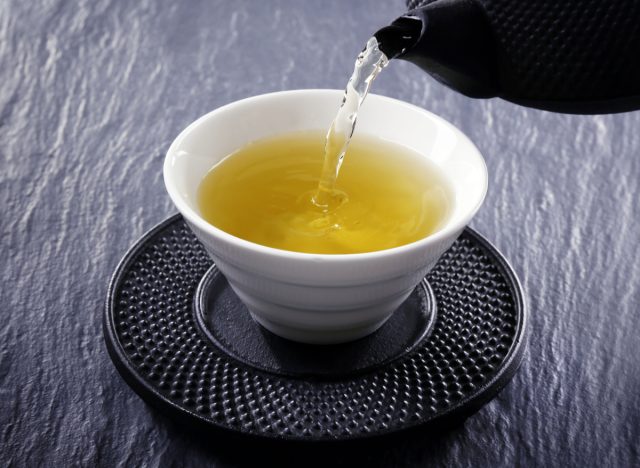
For many people, green tea takes some getting used to. But once you learn to love it—unsweetened, of course—it can be a powerful habit for speeding up abdominal fat loss. Why?
"It contains caffeine, a stimulant, and phytochemicals called catechins, both of which may enhance fat burning," says registered dietitian Rachel Dyckman, RDN, owner of Rachel Dyckman Nutrition LLC.
In fact, one study, published in the Journal of Functional Food, found that the catechins in green tea may be able to specifically help target visceral fat loss. Another study, published in the International Journal of Environmental Research and Public Health, also notes that high-consumption of green tea—four or more cups a week—was associated with greater abdominal fat loss in women.
Learn to limit artificially sweetened beverages.
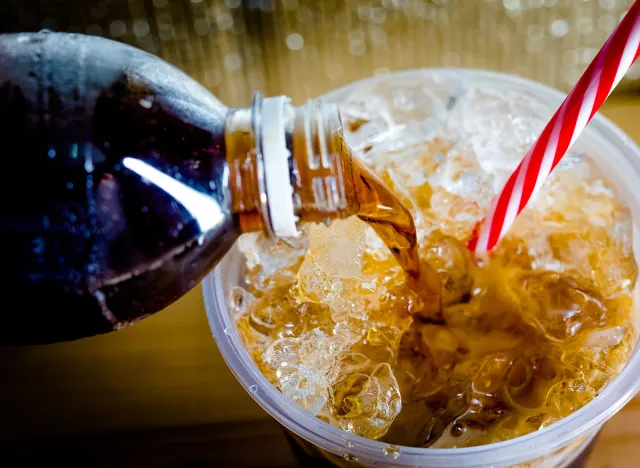
If you've been in the habit of drinking diet sodas made with artificial sweeteners, try weaning yourself off of them and learn to love unsweetened drinks.
"Sucrose [aka Splenda] causes gastrointestinal irritation and bloating, and it reduces the healthy gut bacterium, a factor in weight gain and inflammation," says nutritionist Lisa Richards, author of The Candida Diet.
In addition, artificial sweeteners have been linked to overeating. One study, which was published in Nutrition, Obesity, and Exercise, found that your body may expect extra calories and sugar when you have something that is super sweet (like a diet soda) but contains no calories. As a result, you crave the calories that you're missing. The female participants were also found to have consumed more calories during a corresponding meal after consuming the artificial sweetener. When trying to find helpful drinking habits to shrink abdominal fat, consuming fewer diet drinks may be a good place to start.
Significantly limit those happy hours.
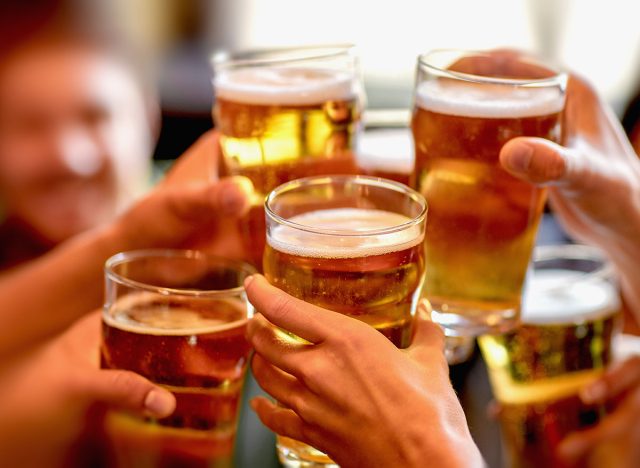
Happy hours and parties are occasions when we tend to overindulge in alcohol. Even a glass or two of wine with dinner every night can easily extend to more, and calories from alcohol can quickly add up. In fact, one study from Epidemiology and Health found that heavy drinking was linked to a larger waist circumference.
"As a dietitian focusing on polycystic ovary syndrome (PCOS), I've watched women struggle to lose weight or get an edge on their insulin resistance until they've cut back on drinking alcohol," says Bess Berger, RDN, a women's health dietitian and owner of Nutrition by Bess.
Additionally, Berger points out that alcohol slows one's metabolism, so cutting out drinking or significantly limiting your imbibing may speed up tummy fat loss.
"Calories from alcohol add up without you realizing it," adds Berger. "And if you enjoy mixed drinks, remember that the calories and sugars in the mixers can add up even more quickly."
A previous version of this story was published on March 4, 2022. It has been updated to include additional copy and proofreading revisions, additional research, and updated contextual links.
- Source: https://www.science.org/doi/10.1126/science.abe5017
- Source: https://www.ncbi.nlm.nih.gov/pmc/articles/PMC3276215/
- Source: https://www.mayoclinic.org/healthy-lifestyle/womens-health/in-depth/menopause-weight-gain/art-20046058#:~:text=The%20hormonal%20changes%20of%20menopause,as%20lifestyle%20and%20genetic%20factors.
- Source: https://www.cdc.gov/mmwr/volumes/65/wr/mm6536a3.htm
- Source: https://www.ncbi.nlm.nih.gov/pmc/articles/PMC4018766/
- Source: https://www.nature.com/articles/ijo2012225
- Source: https://www.karger.com/Article/Abstract/177854
- Source: https://www.sciencedirect.com/science/article/abs/pii/S0963996914003378
- Source: https://www.sciencedirect.com/science/article/pii/S1756464611001162
- Source: https://www.ncbi.nlm.nih.gov/pmc/articles/PMC8910422/
- Source: https://jamanetwork.com/journals/jamanetworkopen/fullarticle/2784545?utm_source=For_The_Media&utm_medium=referral&utm_campaign=ftm_links&utm_term=092821
- Source: https://www.ncbi.nlm.nih.gov/pmc/articles/PMC2984859/







